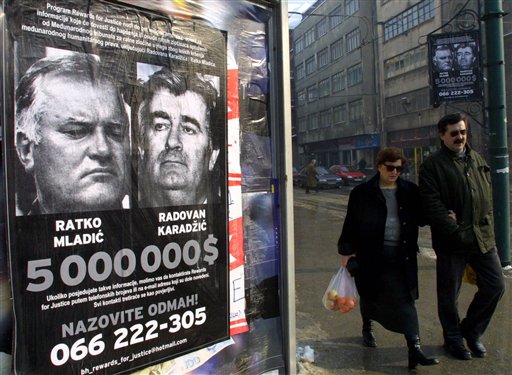This morning saw news of two major breakthroughs in the search for war crimes fugitives worldwide. The item that immediately captivated the international press was the arrest of former Bosnian Serb Gen. Ratko Mladic; the second, less-trumpeted victory was the capture of Bernard Munyagishari, accused of helping to plan the 1994 genocide of 800,000 Tutsis in Rwanda.
Both men were on war crimes-related wanted lists advertised by the State Department’s Rewards for Justice program: Mladic was one of two people on a list of fugitives sought by the International Criminal Tribunal for the Former Yugoslavia (ICTY); Munyagishari was one of 10 men sought by the International Criminal Tribunal for Rwanda (ICTR).
Ten fugitives from the combined lists — men the State Department hopes to see featured in headlines similar to today’s — remain at large. The fact that nine of them are related to a conflict in Africa (the Rwandan genocide), and only one to a European conflict, signifies that our attention is likely to turn ever more to the former continent in the continuing search for high-profile fugitives. (The Simon Wiesenthal Center keeps a list of the most wanted Nazi war criminals but, as the center itself points out, there is a significant chance that those who have not yet been located are already deceased.)
The final figure sought by the ICTY is Goran Hadzic (53), who has been missing since 2004. According to a PBS “Frontline” profile:
Hadzic faces 14 counts of war crimes and crimes against humanity for his alleged involvement in the forcible removal and murder of thousands of Croatian civilians from the Republic of Croatia between 1991 and 1993. His indictment specifically names the 1991 massacre of 250 Croatian and non-Serb civilians from the Vukovar hospital in one of the first atrocities of the war.
The other nine war crimes fugitives listed by the Rewards for Justice program — these sought by the ICTR — are:
- Augustin Bizimana, minister of defense and controller of the Rwandan Armed Forces during the Rwandan genocide.
- Felicien Kabuga, co-founder of the Fonds de Défense Nationale — through which organization he “is alleged to have provided funds to the interim Rwandan government for the purposes of executing thr 1994 genocide.”
- Fulgence Kayishema, former police inspector of the Kivumu commune during the 1994 Nyarubuye massacre.
- Protais Mpiranya, commander of the Rwandan army’s Presidential Guard during the Rwandan genocide. According to the State Department, “Mpiranya is alleged to have directed the Presidential Guard in sexually assaulting and killing Rwandan Prime Minister Agathe Uwilingiyimana and murdering ten Belgian UN peacekeepers who had been guarding her house.”
- Pheneas Munyarugarama, a lientenant colonel in the Rwandan Army during the genocide.
- Aloys Ndimbati, former mayor of the Gisovu commune, accused of abetting and participating in the Bisesero massacres in the spring of 1994.
- Ladislas Ntaganzwa, former mayor of the Nyakizu commune, “accused of being one of the main instigators of the genocide in the Butare Prefecture.”
- Charles Ryandikayo, a former restaurant manager, accused of “instigating” and participating in a massacre at the church of Mubuga.
- Charles Sikubwabo, former mayor of the Gishyita commune, accused of “instigating” the Mubuga church and other massacres.


